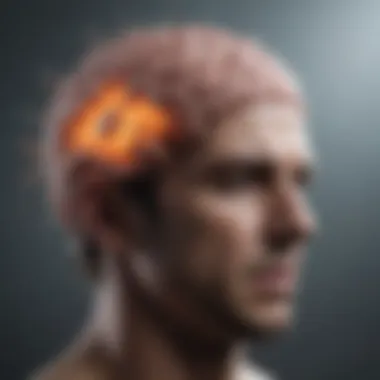Navigating Anxiety Attacks: Effective Strategies and Insights for Resilience


Understanding Mental Health and Well-being
In delving into the intricate realm of anxiety attacks, it is imperative to grasp the essence of mental health. Mental health encapsulates an individual's cognitive, emotional, and social well-being. It influences how one thinks, feels, and behaves, shaping their ability to handle stress, relate to others, and make choices. Understanding mental health involves recognizing the significance of psychological wellness in leading a fulfilling and balanced life.
The Importance of Prioritizing Mental Well-being
Prioritizing mental well-being is not a luxury but a fundamental aspect of sustaining overall health and vitality. Neglecting mental well-being can precipitate an array of challenges, ranging from heightened stress levels to diminished productivity and deteriorating relationships. By acknowledging the importance of mental well-being, individuals cultivate resilience, emotional intelligence, and adaptive coping mechanisms to navigate life's inevitable challenges.
Common Mental Health Challenges and Disorders
Within the spectrum of mental health challenges lie an array of disorders that can afflict individuals. Conditions such as anxiety disorders, depressive disorders, and post-traumatic stress disorder (PTSD) represent common mental health challenges encountered by many. Recognizing these challenges is crucial in promoting early intervention, fostering support networks, and debunking stigmas surrounding mental health issues. By shedding light on common mental health challenges, the path to acceptance, understanding, and healing can be paved.
Introduction
In the realm of mental health, the intricate web of anxiety attacks demands careful examination and understanding. Anxiety attacks are not mere moments of stress; they are complex manifestations of psychological distress that can significantly impact an individual's well-being. This article serves as a beacon of knowledge, shedding light on the multifaceted nature of anxiety attacks and emphasizing the urgency of addressing them with empathy and expertise.
Defining Anxiety Attacks
To navigate the labyrinth of anxiety attacks effectively, one must first grasp their very essence. Anxiety attacks entail overwhelming periods of acute fear and distress that transcend normal levels of anxiety. They are characterized by a concoction of physical, emotional, and cognitive symptoms that can leave individuals feeling utterly helpless and vulnerable.
Importance of Addressing Anxiety Disorders
The significance of addressing anxiety disorders cannot be overstated within the context of mental health advocacy. Anxiety disorders, inclusive of anxiety attacks, can debilitate individuals and hinder their ability to lead fulfilling lives. By delving into the complexities of anxiety disorders, society can foster a more inclusive and supportive environment that promotes mental well-being.
Scope of the Article
Embracing a holistic approach, this article embarks on a journey through the intricate landscape of anxiety attacks. From dissecting key characteristics to unraveling triggers, and from exploring symptoms to advocating for self-care strategies, this guide offers a comprehensive roadmap for individuals seeking to conquer anxiety's grip. By delineating the scope of our exploration, we pave the way for a profound understanding of anxiety attacks and present readers with practical tools to navigate their mental health journey effectively.
Understanding Anxiety Attacks
Anxiety attacks are a crucial aspect of mental health that this article critically discusses. By delving into the key characteristics and triggers of anxiety attacks, individuals can gain a deeper comprehension of this debilitating condition. Understanding anxiety attacks is essential for effectively managing and overcoming them, making it a focal point in this comprehensive guide.
Key Characteristics of Anxiety Attacks
Sudden Onset of Intense Fear
The sudden onset of intense fear is a defining feature of anxiety attacks. This abrupt and overwhelming feeling of dread can incapacitate an individual, leading to various physical and emotional symptoms. Understanding this key characteristic is paramount in recognizing the gravity of anxiety attacks and developing appropriate coping mechanisms. Although challenging to experience, acknowledging this intense fear is the first step towards managing anxiety attacks effectively.
Physical and Emotional Symptoms
Anxiety attacks manifest through a myriad of physical and emotional symptoms, ranging from palpitations and sweating to fear of losing control and irritability. These symptoms can vary in intensity and duration, significantly impacting an individual's daily life. By exploring these symptoms in detail, individuals can better identify and address their anxiety attacks, aiming to regain a sense of emotional equilibrium.
Duration and Frequency
The duration and frequency of anxiety attacks play a crucial role in understanding the cycle of these episodes. Some individuals may experience brief but intense episodes, while others may encounter prolonged and recurrent bouts of anxiety attacks. Recognizing the patterns of duration and frequency equips individuals with the knowledge needed to implement targeted coping strategies and seek appropriate support. By shedding light on these aspects, this article guides individuals towards managing anxiety attacks effectively.
Distinguishing Between Panic Attacks and Anxiety Attacks


Distinguishing between panic attacks and anxiety attacks is vital in navigating the complex landscape of mental health conditions. While both share overlapping symptoms, such as palpitations and shortness of breath, the underlying triggers and responses differ significantly. Understanding these distinctions enables individuals to seek tailored interventions and strategies that cater to their specific needs, fostering a more nuanced approach towards managing anxiety-related challenges.
Biological and Psychological Factors
Exploring the intricate interplay of biological and psychological factors in anxiety attacks unveils a deeper understanding of this mental health condition. From the role of neurotransmitters influencing emotional responses to how genetic predispositions shape individual vulnerabilities, these factors contribute significantly to the onset and development of anxiety attacks. Furthermore, the impact of trauma and chronic stress underscores the complex nature of anxiety disorders, highlighting the importance of a holistic approach to treatment and management.
Role of Neurotransmitters
The role of neurotransmitters in anxiety attacks underscores the biochemical basis of these emotional disturbances. From regulating mood to modulating stress responses, neurotransmitters are integral to how the brain processes anxiety-inducing stimuli. Recognizing the impact of neurotransmitters on anxiety attacks empowers individuals to explore targeted interventions that address these underlying biochemical imbalances, paving the way for more effective management and recovery.
Genetic Predisposition
Genetic predispositions can significantly influence an individual's susceptibility to anxiety attacks. By unraveling the genetic components that contribute to anxiety disorders, individuals can gain insights into their risk factors and susceptibility to these conditions. Understanding these genetic predispositions not only sheds light on the hereditary nature of anxiety attacks but also informs personalized approaches to treatment and management, emphasizing the importance of genetic counseling and tailored support.
Trauma and Stress
The longstanding impact of trauma and chronic stress on anxiety attacks is profound, affecting individuals on emotional, cognitive, and physiological levels. Traumatic experiences can imprint lasting effects on mental well-being, exacerbating anxiety symptoms and triggering recurrent attacks. By addressing past traumas and developing coping mechanisms to manage ongoing stressors, individuals can mitigate the impact of these factors on their anxiety attacks, paving the way towards healing and resilience.
Triggers of Anxiety Attacks
An exploration of the diverse triggers of anxiety attacks sheds light on the multifaceted nature of this mental health condition. Environmental factors, personal triggers, and social stressors can all contribute to the onset and exacerbation of anxiety attacks, creating a complex tapestry of influences that individuals must navigate. Identifying and understanding these triggers is essential in developing personalized coping strategies and resilience-building techniques that empower individuals to proactively manage their anxiety attacks.
Environmental Factors
Environmental factors encompass a wide range of stimuli, from noise pollution to crowded spaces, that can precipitate anxiety attacks. By recognizing how environmental cues impact individual anxiety levels, individuals can create supportive environments that foster emotional well-being and reduce the risk of triggering episodes. Understanding the role of environmental factors in anxiety attacks is key to fostering a sense of control and agency over one's mental health.
Personal Triggers
Personal triggers encompass internal cues, memories, or thought patterns that unleash anxiety attacks. These triggers are highly individualized and can stem from past traumas, unresolved conflicts, or cognitive distortions. By identifying and addressing personal triggers, individuals can gain a deeper understanding of their anxiety attacks, unraveling the psychological layers that contribute to their distress. Developing personalized coping strategies tailored to these triggers is essential in managing anxiety attacks effectively.
Social Stressors
Social stressors encompass relational dynamics, societal pressures, and interpersonal conflicts that evoke anxiety attacks. The complex interactions within social spheres can significantly impact mental well-being, triggering distress and exacerbating anxiety symptoms. By dissecting the role of social stressors in anxiety attacks, individuals can cultivate healthier relationships, set boundaries, and seek social support that buffers against the detrimental effects of these stressors. Building resilience in the face of social stressors is paramount in fortifying one's mental health against external pressures.
Symptoms of Anxiety Attacks
In the realm of managing anxiety attacks, understanding the symptoms is crucial. Symptoms serve as the body's alarm system, indicating the presence of underlying issues that need attention and care. By recognizing these symptoms, individuals can take proactive steps towards managing their anxiety effectively. Identifying symptoms not only aids in early intervention but also empowers individuals to address their mental health with resilience and determination.
Physical Symptoms
Shortness of Breath
Shortness of breath is a pervasive physical symptom of anxiety attacks. It can manifest as a feeling of suffocation or tightness in the chest, often leading to increased heart rate and heightened alertness. This sensation is a hallmark of anxiety attacks, signaling the body's stress response and triggering a cascade of physiological reactions. Understanding and addressing shortness of breath play a pivotal role in managing anxiety attacks, as proper breathing techniques can help regulate the body's stress response and promote relaxation.
Rapid Heartbeat
A rapid heartbeat is another common physical symptom experienced during anxiety attacks. The heart races to pump oxygen-rich blood to vital organs in preparation for fight or flight. While this physiological response is natural, it can be unsettling for individuals experiencing anxiety attacks. Monitoring heart rate and practicing relaxation techniques can help mitigate the effects of a rapid heartbeat during anxious episodes, promoting a sense of calm and control.
Sweating


Excessive sweating is often associated with anxiety attacks, linked to the body's attempt to regulate temperature under stress. Sweat production increases as the body releases heat, contributing to feelings of discomfort and unease. While sweating is a natural bodily function, its heightened presence during anxiety attacks can add to the overall sense of anxiety. Managing sweating through relaxation techniques and maintaining a cool environment can aid in alleviating this symptom and promoting a sense of well-being.
Emotional Symptoms
Fear of Losing Control
The fear of losing control is a prevalent emotional symptom of anxiety attacks, characterized by a sense of impending doom or helplessness. This emotional response can escalate anxiety levels and intensify physical symptoms, creating a cycle of distress. Acknowledging and addressing this fear is essential in managing anxiety attacks, as it allows individuals to confront their emotions constructively and work towards regaining a sense of empowerment and stability.
Overwhelming Sense of Dread
An overwhelming sense of dread is a profound emotional symptom experienced during anxiety attacks. It pervades the mind with feelings of doom and gloom, heightening anxiety levels and clouding rational thinking. Dealing with this emotional burden involves practicing mindfulness and grounding techniques to reorient thoughts and emotions towards a more balanced perspective. By cultivating awareness and acceptance, individuals can navigate through the overwhelming sense of dread with composure and resilience.
Irritability
Irritability is a common emotional symptom that accompanies anxiety attacks, leading individuals to feel on edge and easily provoked. This emotional state can strain relationships and elevate stress levels, adding to the overall burden of anxiety. Managing irritability involves identifying triggers and implementing coping strategies such as deep breathing and communication techniques to diffuse tension and promote emotional well-being.
Cognitive Symptoms
Racing Thoughts
Racing thoughts are a cognitive symptom of anxiety attacks, characterized by a rapid influx of unsettling ideas and scenarios. These intrusive thoughts can heighten anxiety levels and obscure rational thinking, making it challenging to focus on the present moment. Practicing cognitive restructuring and mindfulness can help individuals address racing thoughts effectively, fostering mental clarity and reducing cognitive overwhelm.
Difficulty Concentrating
Difficulty concentrating is a cognitive symptom that hampers cognitive function during anxiety attacks. Individuals may struggle to focus on tasks or maintain attention, leading to decreased productivity and increased frustration. Implementing strategies such as time management and focusing exercises can aid in overcoming difficulties in concentration, enhancing cognitive performance and emotional resilience.
Catastrophic Thinking
Catastrophic thinking is a cognitive symptom characterized by the tendency to imagine the worst-case scenarios in any given situation. This pessimistic mindset fuels anxiety and amplifies emotional distress, making it challenging to manage anxiety attacks effectively. Challenging catastrophic thoughts through cognitive behavioral therapy techniques and reframing exercises can help individuals cultivate a more balanced and constructive thought pattern, reducing the impact of catastrophic thinking on their mental well-being.
Managing Anxiety Attacks
In this pivotal section of the article, the focus shifts to the critical aspect of managing anxiety attacks. Understanding and effectively dealing with anxiety attacks is paramount for individuals seeking to enhance their mental well-being and overall quality of life. By delving into strategies for managing anxiety attacks, this guide aims to empower readers with actionable steps and practical insights that can aid in combating the debilitating effects of anxiety. The significance of managing anxiety attacks cannot be understated, as it plays a crucial role in fostering resilience, promoting self-care, and instilling a sense of confidence in individuals grappling with anxiety-related challenges.
Self-Care Strategies
Deep Breathing Exercises
Deep breathing exercises serve as a cornerstone in the realm of self-care for addressing anxiety attacks. The innate simplicity and profound impact of deep breathing techniques make them a go-to resource for individuals navigating the complexities of anxiety management. By emphasizing controlled breathing patterns and promoting relaxation responses, deep breathing exercises effectively assist in reducing anxiety levels, enhancing emotional regulation, and fostering a sense of calm amidst turbulent thoughts and emotions. The versatility and accessibility of deep breathing exercises make them a versatile tool that can be easily incorporated into daily routines, offering individuals a reliable method for managing anxiety attacks with efficacy and ease.
Mindfulness Meditation
Mindfulness meditation emerges as a transformative practice in the realm of anxiety management. By cultivating present-moment awareness and fostering a non-judgmental stance towards one's thoughts and emotions, mindfulness meditation enables individuals to detach from anxious triggers and hone their focus on the present. The meditative nature of mindfulness practices encourages individuals to observe their anxiety without becoming entangled in its grip, thereby fostering greater clarity of mind, emotional equilibrium, and overall well-being. The adaptability of mindfulness meditation makes it a versatile intervention that can be personalized to suit individual preferences and seamlessly integrated into daily routines for sustained anxiety management benefits.
Regular Exercise
Regular exercise stands out as a formidable ally in the pursuit of managing anxiety attacks effectively. Engaging in physical activity has been lauded for its multifaceted benefits on mental health, including anxiety reduction, stress alleviation, and mood enhancement. The physiological responses elicited by exercise, such as the release of endorphins and reduction of cortisol levels, contribute to a holistic approach towards managing anxiety attacks. By incorporating regular exercise into their lifestyles, individuals can reap the rewards of improved mental resilience, heightened emotional well-being, and heightened self-efficacy in combating anxiety challenges.


Professional Interventions
Therapy and Counseling
Therapy and counseling occupy a pivotal role in the professional interventions available for managing anxiety attacks. The structured, supportive environment provided by therapy sessions offers individuals a safe space to explore their anxiety triggers, develop coping strategies, and gain insights into their emotional patterns and responses. The tailored guidance and evidence-based techniques offered by mental health professionals equip individuals with the tools needed to navigate the intricacies of anxiety management, fostering resilience, and empowering individuals towards sustainable recovery.
Medications
Medications represent a valuable resource in the spectrum of professional interventions for managing anxiety attacks. Prescribed medications, such as selective serotonin reuptake inhibitors (SSRIs) and benzodiazepines, can aid in alleviating severe anxiety symptoms, restoring neurotransmitter imbalances, and regulating physiological responses to stress. While medication should be viewed as part of a comprehensive treatment plan under the guidance of a qualified healthcare provider, its potential benefits in augmenting anxiety management strategies cannot be overlooked.
Alternative Treatments
Alternative treatments offer a complementary approach to traditional interventions for managing anxiety attacks. Modalities such as acupuncture, yoga, and herbal supplements present individuals with diverse options for addressing anxiety symptoms and promoting overall well-being. The integrative nature of alternative treatments allows individuals to tailor their anxiety management strategies to align with personal preferences and holistic well-being goals, resulting in a more comprehensive and individualized approach towards overcoming anxiety challenges.
Lifestyle Modifications
Healthy Diet
A healthy diet serves as a cornerstone of lifestyle modifications for managing anxiety attacks. The direct correlation between nutrition and mental health underscores the importance of maintaining a balanced diet rich in essential nutrients, vitamins, and minerals. By fueling the body with nourishing foods, individuals can support overall well-being, regulate mood fluctuations, and optimize neurotransmitter function, thereby fortifying their resilience in coping with anxiety triggers.
Adequate Sleep
Adequate sleep plays an indispensable role in the realm of anxiety management, with restorative sleep serving as a pillar of emotional regulation and cognitive function. Prioritizing healthy sleep patterns, establishing a bedtime routine, and creating a conducive sleep environment are foundational steps in fostering quality sleep and combating sleep disturbances commonly associated with anxiety disorders. By integrating adequate sleep practices into daily routines, individuals can augment their anxiety management strategies and enhance their overall mental well-being
Stress Management Techniques
Stress management techniques offer individuals versatile tools for navigating anxiety triggers and promoting emotional resilience. Practices such as journaling, progressive muscle relaxation, and time management enable individuals to identify stressors, implement coping strategies, and cultivate adaptive responses to challenging situations. By incorporating stress management techniques into daily routines, individuals can proactively address anxiety triggers, regulate stress levels, and bolster their emotional well-being in a sustainable manner.
Preventing Future Anxiety Attacks
Preventing future anxiety attacks is a crucial aspect of managing anxiety disorders for individuals looking to prioritize their mental health and well-being. By identifying triggers and patterns that precede anxiety attacks, individuals can proactively take steps to reduce the likelihood of their occurrence. This proactive approach empowers individuals to build resilience and confidence in navigating the complexities of anxiety-related challenges. Understanding one's unique triggers and behavioral patterns allows for the development of tailored strategies that effectively mitigate the impact of anxiety attacks. Through consistent observation and reflection, individuals gain valuable insights into their mental and emotional processes, facilitating a more proactive and holistic approach to anxiety management.
Identifying Triggers and Patterns
In the journey of managing anxiety attacks, identifying triggers and patterns plays a pivotal role in enhancing self-awareness and fostering emotional regulation. Triggers are the stimuli or situations that elicit a stress response, while patterns refer to the recurring behaviors or reactions that follow. By closely monitoring these triggers and patterns, individuals can gain a deeper understanding of the root causes behind their anxiety attacks. This awareness enables individuals to implement tailored coping mechanisms and preventive strategies to address specific triggers effectively. Additionally, recognizing patterns allows individuals to anticipate and mitigate the escalation of anxiety symptoms, leading to improved emotional well-being and enhanced resilience.
Building a Strong Support System
Building a strong support system is imperative in navigating the challenges posed by anxiety disorders and preventing future anxiety attacks. A robust support network provides individuals with emotional reassurance, practical assistance, and a sense of belonging during times of distress. By surrounding oneself with understanding and empathetic individuals, those struggling with anxiety can feel validated and supported in their journey towards mental wellness. Friends, family members, support groups, or mental health professionals can all contribute to a strong support system, offering diverse perspectives and resources to facilitate effective coping strategies and sustained emotional well-being.
Seeking Ongoing Professional Help
Seeking ongoing professional help is a proactive step towards managing anxiety attacks and fostering long-term mental health. Mental health professionals, such as therapists, counselors, or psychiatrists, possess the expertise and experience to provide tailored treatment plans and evidence-based interventions for anxiety disorders. Regular therapy sessions offer individuals a safe space to explore and address underlying emotional issues, develop coping skills, and cultivate resilience. Moreover, professionals can recommend personalized strategies and treatments to prevent future anxiety attacks, empowering individuals to regain control over their mental well-being and lead fulfilling lives.
Conclusion
Anxiety attacks are a complex and challenging phenomenon that impact many individuals profoundly. As discussed in this comprehensive guide, understanding the nuances of anxiety attacks is essential for effective management and coping strategies. By delving into the causes, symptoms, and varied approaches to tackling anxiety attacks, individuals can equip themselves with the necessary tools to navigate these turbulent experiences with resilience and confidence. This article aims to shed light on the multifaceted nature of anxiety attacks, offering valuable insights to empower individuals in their journey towards mental well-being and self-care.
Embracing Resilience and Self-Care
When it comes to dealing with anxiety attacks, embracing resilience and self-care plays a pivotal role in promoting mental well-being. Resilience involves the capacity to bounce back from adversity, maintaining a sense of balance and perspective during challenging times. By prioritizing self-care practices such as engaging in mindfulness activities, nurturing positive relationships, and practicing relaxation techniques, individuals can cultivate a mindset of resilience that empowers them to face anxiety attacks with strength and perseverance. Embracing resilience and self-care not only enhances one's ability to cope with anxiety attacks but also cultivates a sense of self-empowerment and emotional stability.
Moving Forward with Confidence
Moving forward with confidence after experiencing anxiety attacks is a significant milestone in the journey towards mental health and well-being. Confidence in this context refers to the belief in one's ability to navigate challenges and uncertainties, trusting in one's capacity to overcome obstacles that come their way. By acknowledging past experiences, reflecting on personal growth, and setting realistic goals for the future, individuals can foster a sense of confidence that propels them forward. Moving forward with confidence involves embracing vulnerabilities, seeking support when needed, and fostering a positive mindset that instills faith in one's resilience and capacity to overcome adversity. By stepping into the future with a sense of assurance and self-belief, individuals can chart a path towards healing and emotional wellness.















